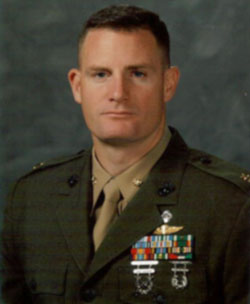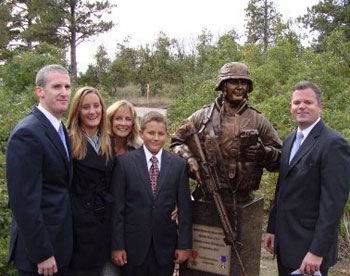REDMOND, Wash. – Oct. 15, 2009 – Lieutenant Colonel Kevin Shea didn’t have to stay in Fallujah, but he wouldn’t leave his men.
It was the summer of 2004, and Shea had to set up a new communications system for his regiment of U.S. Marines as they moved into Iraq’s dangerous Al Anbar province. When his tour of duty came to an end that summer, Shea was free to return to his family in California. However, a communications officer had not yet arrived to replace him.

“Leading these young Marines in combat is something I will never forget. They have been magnificent,” Lt. Col. Kevin Shea wrote to his brother in 2004. “They are America’s best.”
In an e-mail to his younger brother, Dan, now a Microsoft employee relations investigator, Shea wrote: “Leading these young Marines in combat is something I will never forget. They have been magnificent. I cannot say enough about them. They are America’s best. I cannot let anything happen to them.”
As much as Kevin Shea wanted to return home safely, he wanted the same for his men. So the regimental communications officer for the 1st Marine Regiment, 1st Marine Expedition Force decided to stay at Camp Fallujah until his replacement arrived.
In an e-mail to his younger brother in early September 2004, Shea reflected on the challenge of his mission. “I’d have to say that I’m ready to come home….just 2 more months,” Shea wrote. “This whole experience has left a mark on me. I certainly know what is important to me and what I want out of life. Bullets, mortars, rockets, and RPGs [rocket-propelled grenades] certainly add a great clarity to your life.”
Two weeks after writing those words, Kevin Shea was killed in a rocket attack on Camp Fallujah. It was Sept. 14, 2004 – his 38th birthday. He left behind a wife, a young daughter and son, two brothers, his parents, and many other lives he’d touched along the way during his busy, active life.
Dan Shea and his family were devastated.
“Early on I sort of realized that with grief, and especially profound grief like that, you can really get some energy from it to do other things with it,” Dan Shea recalled. “You’re not going to get rid of it, but you can use it to do other things. Part of you does sometimes want to curl up in a ball and not really worry about the outside world because of this really screwed up thing that happened. My brother was my hero. It is great to have had him as a big brother, but the message I get from him is to help. That’s sort of how I cope with it.”
Before long, Shea started speaking out. He wrote letters to the editor and started campaigning for causes he believed in. His first letter to the editor at The New York Times was about voter apathy.
“I was frustrated because people were talking about not voting in the 2004 election. I thought, ‘Are you kidding me?’ I didn’t come out on one side or the other but tried to get more people to vote,” Shea said.
Then he spoke out in a New York Times op-ed piece about eliminating the “Widow’s Tax,” a costly tax on the federal benefits to the spouses of those killed in combat.
“I am frustrated now because back in 2006 we had the economic wherewithal to do it,” Shea said. “With people and banks now lined up for government aid, these widows should probably be first in line.”
Then Shea started thinking about people injured in war.
“You don’t really hear that much or even read stories about people who are injured,” Shea said. “You don’t read about the guy who lost an arm or foot or whose body was burned. It happens, and it happens more often than what happened to my brother.”
That’s when Shea got involved with the Fisher House Foundation, which was created in 1990 by Zachary and Elizabeth Fisher to provide lodging to families of injured service members and veterans.

Microsoft Employee Relations Investigator Dan Shea, shown here on the left with his brother Kevin Shea and his nephew Michael, said rather than being paralyzed by the grief of losing his brother, he used it as a call to action.
There are now more than 40 Fisher Houses on or near the grounds of veterans hospitals. The organization has saved families more than $70 million in lodging expenses.
Shea said that more than 32,000 soldiers have been injured since the start of U.S. engagements in Afghanistan and Iraq. The most severe are combat injuries to the brain and spine. But amputated limbs also are common. Military hospital stays for these types of injuries often last for months, sometimes longer, and family members of injured soldiers often are not able to afford to stay nearby or make frequent trips to visit.
Shea is a spokesperson, fund-raiser, and former vice president for the nonprofit group Friends of the VA (Veterans Affairs) Puget Sound Fisher House. With the group’s help, the VA Puget Sound Fisher House has served more than 700 families of veterans and active duty military personnel since it opened in 2008 on the hospital campus. The house has 21 guest suites to provide a “home away from home” for the family and loved ones of those receiving care in the VA Puget Sound Health Care System.
Ernie Butler, board vice president of Friends of the VA Puget Sound Fisher House and executive director of the Northwest Chapter of Paralyzed Veterans of America, said, “I don’t think you can attach how great of an importance it is to welfare and healing of patients to have a loved one nearby.”
Butler, an Air Force veteran and paraplegic, was a member of the U.S. Skydiving Team and was injured at the world championships in France in 1995.
“I ran into the planet going a little too fast,” he said.
After spending six weeks at a hospital in France, Butler returned for a stay and rehabilitation at the Veterans Administration Puget Sound Hospital in Seattle. His mother was able to afford to visit him only a few times, and his family had to travel back and forth from his home in Arlington, Wash., to see him.
“That’s one of the reasons I’m on the board,” Butler said. “I know how important it would have been to have them there.”
Butler said that Shea is a tremendous asset to the local and national Fisher House organizations and that he admires Shea’s passionate and eloquent advocacy.
“I commend him for it. How difficult is it to get on board after such a horrible loss?” Butler said.
Dan Shea also continues to honor the memory of his brother. He did an interview with a local documentary crew for a 20-minute public television program on Kevin Shea’s story. He and his family recently attended the dedication of a statue in his brother’s honor – a bust of Kevin Shea in the Air Force Academy’s Garden of Heroes near Colorado Springs, Colo.

Dan Shea (left) attended the dedication of Kevin Shea’s memorial statue at the U.S. Air Force Academy in Colorado along with Kevin’s daughter, Brenna Shea, 15; Kevin’s widow, Ami Shea; Kevin’s son, Michael Shea, 12; and the third Shea brother, Tom Shea.
Kevin Shea graduated from the United States Air Force Academy, where he lettered in football, played on the 1987 Freedom Bowl team, and played club rugby for the 1989 collegiate national champions. In 1989, he successfully competed for an inter-service transfer and became a Marine second lieutenant.
He served in the first Gulf War, continued to receive promotions, and completed a master’s degree in electrical engineering at the Naval Postgraduate School in California. He then served as an electrical engineering instructor at the United States Naval Academy and was an assistant coach for the Navy rugby team. The 2003 Naval Academy Class voted him an honorary graduate.
“It’s been a wonderful experience to realize all the people he touched. I’ve been amazed at the outpouring from people. I still get e-mails and phone calls from people who worked with him, who played sports with him, or who went to Air Force Academy with him,” Dan Shea said.
One way he copes is to read over his brother’s e-mails. When he reads them, he is reminded why his brother’s focus was so great.
Shea hopes to raise money and awareness for Fisher House during this month’s Giving Campaign for Microsoft employees, which is being held throughout the month of October.
“The one thing that struck me is how much he talked about these young Marines that were serving under him. They really are America’s best, and I owe it to my brother to not let anything happen to them,” Shea said.





